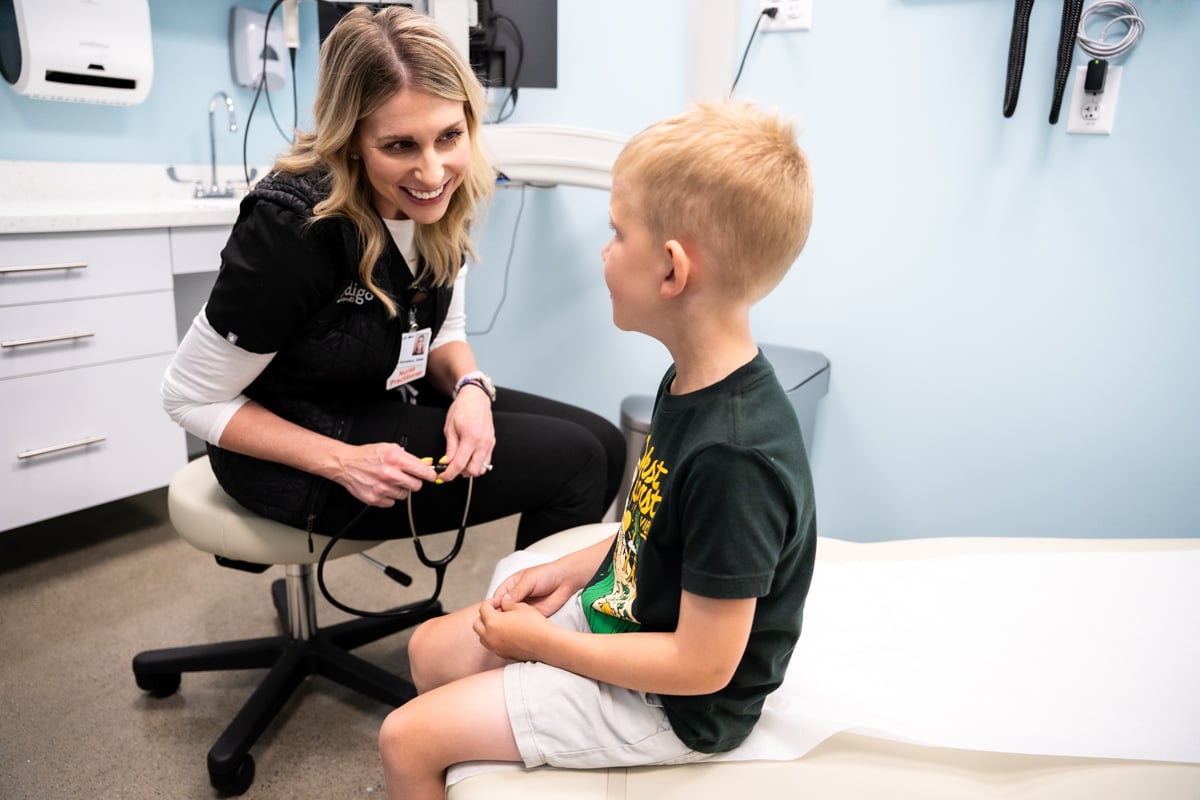At Indigo Urgent Care, our doctors see their fair share of injuries in children and adults, many of which happen at home. As a result, they’re more than aware of the everyday items that can cause serious harm.
We asked some of our urgent care providers what common household items they consider too hazardous to have under their own roofs. Here are eight things you won’t find in their homes and yards.
1. Button batteries
What kid isn’t fascinated by a small, shiny object? While these tiny, coin-shaped batteries are necessary to power our car keys, garage door openers and LED lights, they’re extremely dangerous to young children. If swallowed, a button battery can get lodged in the esophagus. In some cases, leaky battery acid can cause debilitating damage. If you need to have button batteries in the house, make sure they’re stored out of reach of tiny, curious hands.
2. Extension ladders
While your gutters may need de-clogging and the windows could use a wash, tackling those higher-elevation jobs using an extension ladder isn’t a safe option. Falls from high ladders can result in serious and extensive injuries, including head trauma, bone fractures and collapsed lungs. Each year, hundreds of thousands of people in the U.S. are treated for ladder-related injuries, and most of which occur in the home.
While smaller ladders fold out to create four separate points of contact with the ground, extension ladders typically have just two “feet” along their side rails. That means they can be unstable, especially if not set up and used correctly.
3. Trampolines
Sure, they seem like loads of fun, but trampolines are responsible for around 90,000 emergency room visits each year. Using a trampoline can result in sprains, concussions, ligament damage, and neck and spinal cord injuries. The American Academy of Pediatrics recommends trampolines never be used at home – even the mini-size models.
It’s not only medical professionals who consider trampolines a hazard. Just ask your insurance agent. Many homeowner insurance policies prohibit trampolines or come with exclusions for trampoline injuries.
4. Leftover pain medication
Tempted to hold on to that unused bottle of Oxycontin? Don’t. Ingesting old medication is the main cause of injury for children 5 and under. Just one extended-release tablet can result in dire consequences for a child.
Always dispose any unused medication, and make sure you do it safely. Never dump medication down the sink or toilet unless the label says it’s okay to do so. Return unwanted or expired prescription and over-the-counter drugs to a drug take-back site in your area or follow the steps on the label for proper disposal. The Centers for Disease Control and Prevention (CDC) offers additional tips for safe prescription medicine storage and disposal.
As for other medications in the house, keep them in original, child-resistant containers and place them high enough to prevent kiddos from reaching them. (Don’t forget to remind grandma and grandpa to do the same.)
5. Unsecured TVs and furniture.
You see household furnishings. Adventurous tots see jungle gyms waiting to be conquered. Tip-overs can happen when unsecured shelves or other furniture become unbalanced, and that can lead to severe injuries. According to the Consumer Product Safety Commission, more than 11,000 children are injured by furniture and television tip-overs every year.
Medical providers recommend you fasten dressers, bookshelves and entertainment centers to walls and store heavy items on bottom shelves. Televisions should also be mounted or securely fastened to walls.
6. Instant noodle soups.
Cup Noodles and similar products packaged in Styrofoam may be a quick, tasty and economical option, but they’re also an accident waiting to happen. These products get super-hot when zapped in the microwave and can cause burns, especially in toddlers and infants. Kiddos are quick, and it only take a few seconds to pull a hot container off the kitchen counter.
Instant noodle soups are also packed with sodium, MSG and preservatives – more reasons doctors shy away from keeping them in their pantry.
7. Cleaning products that contain bleach.
Bleach is a common household product. But using it to clean your home could put you, your children and your pets at risk. Bleach is highly hazardous, and it’s found in many cleaning supplies, from multipurpose cleaner to stain remover. Along with being a swallowing hazard for young children, bleach residue left behind on surfaces after cleaning may easily transfer to hands and paws. Several studies also indicate a link between bleach used for cleaning to asthma and respiratory conditions, especially among kids. And mixing bleach with other household chemicals can be dangerous.
Check labels to make sure cleaning supplies are bleach-free or opt for natural cleaning products, such as white vinegar and baking soda.
8. Pull-up (or tray-less) high chairs.
Falls are the top reason for emergency room visits. And for kids, it’s often the result of a tumble from a high chair. When a tray-less high chair is pulled up to a table, kids can push their feet against the table and tip the chair backwards. It may only be a few feet to the floor, but a fall from a high chair can result in serious injuries, including:
- Skull fractures and other head trauma
- Neck injuries
- Concussion
- Cuts or scrapes
- Broken bones
- Mouth injuries
- Broken teeth
Indigo is here when injuries happen
Even in the safest households, accidents still happen. Fortunately, our refreshingly friendly Indigo Urgent Care providers are here 8 am to 8 pm every day to treat sprains, strains, bruises and minor cuts that need stitches. And all our Indigo locations offer digital X-ray services to confirm or rule out a minor fracture.
To make care even more convenient for you and your little ones, Indigo offers online care 24/7.


